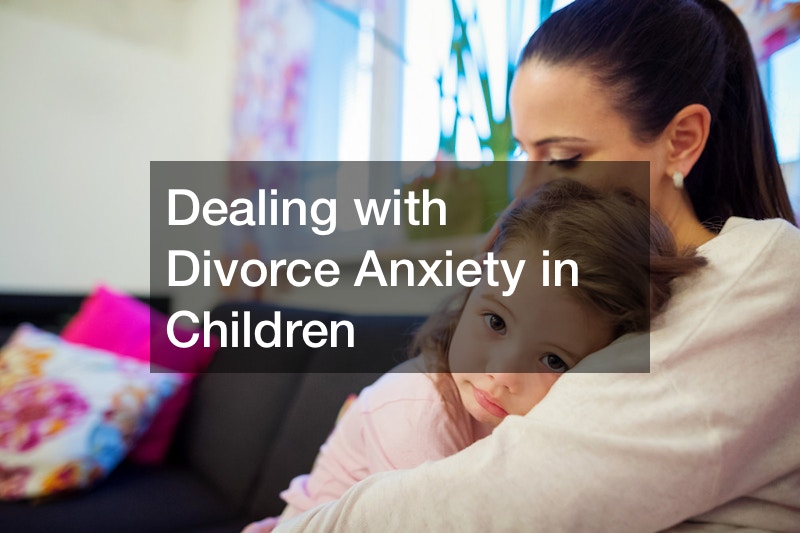
Dealing with divorce anxiety is never easy, especially for younger children. It can be difficult to know how to help a child cope with the range of emotions that come with divorce. Parents should focus on providing comfort, reassurance, and an understanding ear for their children during this difficult time. Below are some tips to help your child when dealing with divorce anxiety that you can use during any point of the divorce process.
Be Transparent About the Situation

From meeting a new divorce attorney to needing to tag along in court appearances, children will be fully aware of the process that’s happening. As such, it’s important to be open and honest with your child about what is going on. Explain the details of the process without overwhelming them, but make sure to provide enough information for them to feel in control and understand the changes occurring in their life.
For instance, you can explain to them you need to work with a divorce lawyer, but will soon be able to move past this process and enjoy life as a family once again. You can tell them they might need to visit the lawyer’s office, but don’t need to worry about it. Or, they might need to visit and sleep in an entirely new home, but can still return to their old home when they need.
Practice Coping Strategies
When it comes to dealing with divorce anxiety, teaching your children how to cope with their emotions and regulate them is essential. For instance, practice deep breathing, mindfulness meditation, or simply just talk about the situation. These strategies will help them handle both big and small changes that come with divorce.
Additionally, it’s important to let them know emotions like anger and sadness are normal during this time, and that it’s okay to express them in healthy ways. Encourage your child to talk about their feelings, listen without judgment, and remind them that you’re there to support them. Learning coping skills can be a bit difficult when dealing with divorce anxiety. For more help, consider talking to your health insurance about mental health counseling options.
Encourage Open Communication
One of the most important things to do when dealing with divorce anxiety is to stay in communication with your child. Open communication is essential because it allows you to see how your child is dealing with the changes and can help build trust between yourself and your child.
Let them know that they are allowed to ask questions, express their feelings, and talk about any concerns or worries they have. If they don’t feel comfortable talking with you, you can suggest that they talk to another adult they trust, such as a grandparent or close family friend. As long as there is someone in the family that your child can trust with their emotions, or even a close friend, you can rest assured your child has an outlet when dealing with divorce anxiety. If you’re using a guardianship lawyer, they can also provide guidance and support during this difficult time in terms of which guardian to turn to.
Encourage Quality Time with Both Parents
When children are dealing with divorce anxiety, they need both parents during this time to ensure they feel safe and secure. Make sure your child spends quality time with both parents, even if the custody arrangement isn’t ideal or you’re living in separate homes.
Encourage your child to have meaningful conversations with both parents and let them know that it’s okay to love each parent equally, even if the relationship between them is strained. Showing your child that both parents are still involved in their life can help ease divorce anxiety and make it easier for your child to adjust to a new situation. If your family law firm suggests joint custody, this could be a great solution for your child.
Don’t Talk Ill Of Your Spouse
Undergoing a divorce and the stress of it can be difficult, but it’s important for you not to talk badly about your spouse in front of your child. Avoid saying anything negative or defamatory about the other parent and try to keep a level head during arguments.
Your child will pick up on any tension between their parents and this can increase divorce anxiety. Instead, focus on teaching your child about the importance of settling differences. Remind them that their parent and you are not at fault. Ultimately, divorce is simply a process of two people separating and going their own way.
Be Patient & Seek Help If Necessary

Dealing with divorce anxiety is a process that takes time, so be patient with your child as they adjust to the changes. Be mindful of how your emotions are affecting them and try your best not to pass on any fear or sadness. Your family law firm will need to take their time settling your case, so it might be a while before you develop a sense of normalcy again.
For your child, it’s best to remain patient and not expect them to adjust immediately. If you’re worried about your child’s emotional well-being or feel like they need extra support, consider talking to a family therapist who specializes in divorce and children. A mental health professional can provide your child with the coping skills needed to navigate this difficult time.
Consider Additional Therapy
Even after a divorce is settled and you’re in a regular routine again, your child might still have difficulty adjusting to their new life. If your child is exhibiting signs of depression, anxiety or behavior changes, it might be time to consider additional therapy.
Therapy can help your child work through their feelings and learn how to cope with the changes in their life. In addition, mental health care services can also provide additional treatment options, such as medications, if your child needs it. While you might be scared to approach the topic, it’s important to remember that additional therapy can be beneficial for your child’s emotional well-being.
Practice Self-Care
Taking care of your own emotional needs is just as important as taking care of your child’s. Make sure you’re taking time to practice self-care and take a break when you need it. During this difficult time, it’s important to remember that everyone involved in the divorce process will benefit from having their emotional needs taken care of, including you.
The more stable and secure both parents are, the better your child will be able to cope with the divorce. Don’t be afraid to reach out for help if you need it and take any necessary steps to ensure that your own emotional needs are being met.
Make Touring New Homes Fun
During the divorce, you will need to find a new place to live. This can be a stressful process for children, as they are used to their current home and the familiarity it provides. To make the tour more enjoyable, try bringing them along and asking them what they think of each house you visit.
This could help your child feel more involved with the decision-making process. Plus, this will also be an opportunity for them to become excited about their new home and the possibilities of decorating it. Getting help from an estate law firm is a great way to make sure the process is smooth and efficient as well. When touring new homes, consider asking your child about their new room, what color they’d like to paint the walls, and other fun topics. Normalizing the moving process can go a long way in dealing with divorce anxiety.
Don’t Make the Entire Day About Divorce
When seeking legal help, visiting a family law firm, or dealing with other divorce-related activities, it’s important to remember that the entire day doesn’t have to be about the divorce. Try making a plan for the day and scheduling something fun afterwards like going out to eat or seeing a movie. This can help create some normalcy during a difficult period of your child’s life.
In addition, it’s important to remember that even during a divorce your child will still need structure. Make sure to give them regular bedtimes and other daily routines like chores, story time, or mealtime. Creating stability for your child is essential in helping them deal with divorce-related anxiety.
Set Up a New Routine

In addition to keeping some of your child’s regular routines, it can be helpful to create a new routine for them. This could include attending a new after-school activity or going to religious services on the weekend. Establishing this new routine will give your child something meaningful and positive to focus on and help them develop their own identity outside the divorce.
If you know your child will need to get used to a new routine, such as commuting to visit the other parent, make sure to give them plenty of time to adjust. Discussing the changes with your child beforehand and providing support throughout the transition can help ease the process.
Trust Your Child’s Feelings
It is important to remember that your child may not want to talk about their feelings surrounding the divorce. Instead, they might express their emotions through different outlets like art or music. Make sure to provide a safe space for your child where they can freely share their thoughts and feelings without worrying about being judged.
Also, make sure your child knows that it is ok to feel a range of emotions throughout the process. Allowing your child to express themselves in whatever way they need can go a long way in helping them cope.
Take Time for Fun Activities
Divorce can be an overwhelming experience for the whole family. To help your child feel more secure during this difficult period try scheduling time for fun activities. Whether it’s a short outing to the park, playing boardgames at home, or having a movie night it’s important to provide some levity and comfort in the midst of such a challenging situation.
You can even consider a family game night with your ex-spouse. Taking time to spend together as a family can help your child feel more connected and secure, even after the divorce. Consider talking to your spouse about planned family dinners and events, so you can both stay prepared.
Consider Emotions Keepsakes
If you need to move, or if one parent is moving out of the house, try to keep some of your child’s favorite items with them. This could include a toy, stuffed animal, or even a family photo they can take with them. Having these things that are familiar and comforting can help make transitions easier for children dealing with divorce anxiety.
If your child is older, they can even create an emotional keepsake box full of things that remind them of their family before the divorce. This could include pictures, cards, letters, and any other items that evoke positive memories.
Avoid Talking About Finances

While it’s important to be transparent with your child about the divorce, it’s best to avoid talking about any financial issues. Discussions of money and other aspects of your divorce can be confusing for children and make them feel guilty or responsible for what is happening in their family life.
If you need someone to talk to about finances, consider consulting with accountants, lawyers, or a financial planner. This can be a great way to gain clarity and make sure you are making decisions in the best interest of your family.
Dealing with divorce anxiety in children can be difficult but with patience, understanding, and support it’s possible for them to find their new normal. Making sure to prioritize their emotional needs throughout this process is essential for helping them cope.



